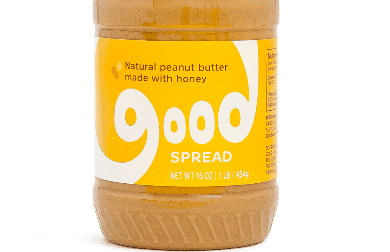
The one-for-one business model has caught on in recent years, with Tom’s shoes being one of the more well-known social enterprises in the space. Other companies, including the eyewear company Warby Parker, have tinkered with one-for-one. But many have found other means to fund what they believe are worthy causes.
Now another social enterprise, Good Spread, is trying to do its part to address the human catastrophe in South Sudan. For every product the company sells, a portion of the profits are donated to organizations that distribute nutrient packs -- which are actually pretty similar to Good Spread peanut butter -- across South Sudan. Think of this purchase as a jar purchased here equals a packet of nutrition sent abroad.
South Sudan is the youngest country in the world, and also one of the planet’s poorest. The World Bank pegs per-capita income in South Sudan at less than $800 annually. Now the nation of 11.3 million people is suffering from one of the world’s worst humanitarian crises.
Estimates suggest that as many as 5 million people are in need of urgent assistance in South Sudan due to what the magazine Foreign Policy called “the famine we could have stopped.” Another 100,000 are in dire risk of starvation.
So, what is one potential salve for this tragedy? Good Spread aims to address the South Sudan crisis with a quintessential American treat, peanut butter. It also happens to be the base of RUTF (ready-to-use therapeutic-food), which is critical in treating people in regions afflicted by severe hunger and famine.
Humanitarian aid agencies have long touted this food as a way to meet the needs of people desperate for fat, protein, calories, vitamins and minerals. NGOs such as Doctors Without Borders have adopted fortified versions of peanut butter including Plumpy’nut: a cheap concoction mixed with powdered milk and other nutrients that can help kids mired in areas ravaged by famine gain weight and, at a minimum, stay alive.
Good Spread, whose founders were inspired by the Doctors Without Borders concoction, is promoting a similar product to treat children in South Sudan afflicted with malnutrition.
The product its founders are promoting is Mana, peanut butter mixed with powdered milk and vitamins that can be eaten out of foil packets. The social enterprise’s founders claim that 96 percent of children who are fed Mana end up on the path to recovery. According to the organization that manufactures Mana, children aged 6 months to 5 years are at the most risk from long-term health problems if they are not nourished.
So far, Good Spread’s products can be found at some retailers including Whole Foods, Kroger and Harris Teeter. Consumers can also purchase products -- including jars and packets of peanut butter, T-shirts, and gift cards -- directly from the company on its website.
Meanwhile, the European Union has announced an emergency humanitarian aid package for South Sudan valued at approximately US$87 million. This latest amount increases Europe’s assistance to South Sudan to more than $400 million since the country declared independence in 2011.
At a time when the U.S. wants to shy away from the 1.2 percent its federal government spends on foreign aid, South Sudan’s crisis shows that the world’s lone superpower cannot ignore the growing risks of conflict emerging worldwide. But the story of Good Spread tells us one thing: Those appalled by this catastrophe can find a way to help out however they can.
Image credit: Good Spread

Leon Kaye has written for 3p since 2010 and become executive editor in 2018. His previous work includes writing for the Guardian as well as other online and print publications. In addition, he's worked in sales executive roles within technology and financial research companies, as well as for a public relations firm, for which he consulted with one of the globe’s leading sustainability initiatives. Currently living in Central California, he’s traveled to 70-plus countries and has lived and worked in South Korea, the United Arab Emirates and Uruguay.
Leon’s an alum of Fresno State, the University of Maryland, Baltimore County and the University of Southern California's Marshall Business School. He enjoys traveling abroad as well as exploring California’s Central Coast and the Sierra Nevadas.














